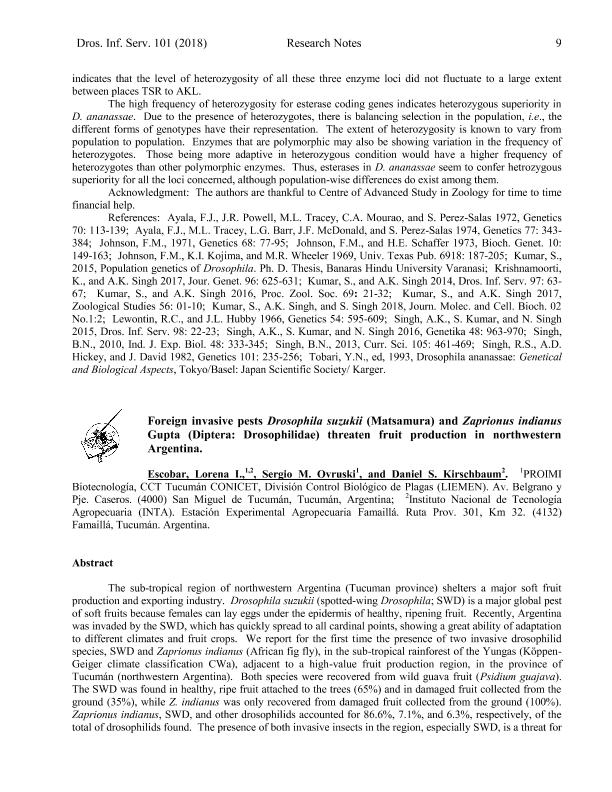Artículo
Foreign invasive pests Drosophila suzukii (Matsamura) and Zaprionus indianus Gupta (Diptera: Drosophilidae) threaten fruit production in northwestern Argentina
Fecha de publicación:
05/2018
Editorial:
University of Oklahoma
Revista:
Drosophila Information Service
ISSN:
0070-7333
Idioma:
Inglés
Tipo de recurso:
Artículo publicado
Clasificación temática:
Resumen
The sub-tropical region of northwestern Argentina (Tucuman province) shelters a major soft fruit production and exporting industry. Drosophila suzukii (spotted-wing Drosophila; SWD) is a major global pest of soft fruits because females can lay eggs under the epidermis of healthy, ripening fruit. Recently, Argentina was invaded by the SWD, which has quickly spread to all cardinal points, showing a great ability of adaptation to different climates and fruit crops. We report for the first t ime the presence of two invasive drosophilid species, SWD and Zaprionus indianus (African fig fly), in the sub-tropical rainforest of the Yungas (KöppenGeiger climate classification CWa), adjacent to a high-value fruit production region, in the province of Tucumán (northwestern Argentina). Both species were recovered from wild guava fruit (Psidium guajava). The SWD was found in healthy, ripe fruit attached to the trees (65%) and in damaged fruit collected from the ground (35%), while Z. indianus was only recovered from damaged fruit collected from the ground (100%). Zaprionus indianus, SWD, and other drosophilids accounted for 86.6%, 7.1%, and 6.3%, respectively, of the total of drosophilids found. The presence of both invasive insects in the region, especially SWD, is a threat for the local berry industry. Since SWD can complete its life cycle in guavas, these fruits would allow the sustainability of SWD populations during the seasons in which commercial berry crops are not in production.Berry growers and plant protection agencies should promptly take measures to limit these pests? dispersion to commercial fruit fields.
Palabras clave:
Spotted Wing
,
African Fig Fly
,
Drosophila
,
Psidium Guajava
Archivos asociados
Licencia
Identificadores
Colecciones
Articulos(PROIMI)
Articulos de PLANTA PILOTO DE PROC.IND.MICROBIOLOGICOS (I)
Articulos de PLANTA PILOTO DE PROC.IND.MICROBIOLOGICOS (I)
Citación
Escobar, Lorena Ines; Ovruski Alderete, Sergio Marcelo; Kirschbaum, Daniel Santiago; Foreign invasive pests Drosophila suzukii (Matsamura) and Zaprionus indianus Gupta (Diptera: Drosophilidae) threaten fruit production in northwestern Argentina; University of Oklahoma; Drosophila Information Service; 101; 5-2018; 9-14
Compartir




